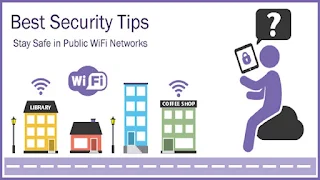With data connection rates still
comparatively pricey in Nigeria, Wi-Fi hotspots are often a source of joy for
most smartphone/device users in need of some free Web browsing or social media
time. The benefits of free Wi-Fi access such as the ease of connectivity and
opportunity to conserve cellular data makes it a common occurrence for most
users to seek out these free connections in public locations such as parks,
banks, hotels, restaurants, etc.
Findings by the Research and
Development Unit of Yudala – Nigeria’s fastest growing composite e-commerce
outfit – show that caution must, however, be exercised when accessing sensitive
personal information and/or carrying out online shopping or mobile banking
activities over a free public Wi-Fi connection as this could pre-dispose you to
grave losses from hackers.
Armed with routers, remote spying
software and other tools of their nefarious trade, these hackers – whose
increasing level of sophistication is a source of global alarm – are capable of
setting up fake hotspots which booby-trap you into thinking you are connecting
to the Wi-Fi of a hotel you are staying in, for instance, while in actuality,
you have fallen prey.
These tips from Yudala’s Research and Development Unit will
help keep you protected:
1.Always
remember you’re vulnerable on public Wi-Fi: This knowledge is
essential as it will help keep you wary when using public Wi-Fi networks. Due
to their often unsecured connections, chances are that the Wi-Fi hotspot you
have so gleefully connected to is also occupied by a potential hacker. Within
this shared virtual space, it becomes considerably more easy to infiltrate your
device and compromise your personal information.
2.Disable
automatic connection to Wi-Fi networks: Most smartphones are capable of
automatically connecting to available Wi-Fi networks – a development that may expose you to lurking
hackers. While this feature is often disabled by default, you can do yourself a
world of good by double-checking to make sure. Better still, you can tweak your
device’s settings to ensure manual connection to Wi-Fi hotspots. This way, you
are protected from unwittingly connecting to a rogue network which may
compromise your privacy and other sensitive information.
3.Verify
the network’s name before connecting: Research shows that most
hackers label their fake hotspots with generic names that may fool you into
thinking you are on the right network. A public institution such as the Nigerian
Communications Commission (NCC), for instance, may not have its public Wi-Fi
network named “Free NCC Wi-Fi.” Same goes for that hotel you may be staying in
or the fast food outlet on the street corner. Obvious generic names such as
these could be a well-sprung trap by a hacker to snare unsuspecting users.
If you are not certain of that
generic name being the official Wi-Fi network you are about to access, you will
do yourself a world of good by asking.
An employee of the organization concerned should be able to guide you in
this regard and help you get connected to the right network. In the event that
there is no one to verify from, it is better to err on the side of caution in
order to avoid being hacked.
4.Stick
to HTTPS for websites: To avoid exposing yourself to the risks of being
hacked over a public Wi-Fi network, stick to websites that use HTTPS during
your internet surfing activity. While regular websites transfer content in
plain text thereby making it an easy target for potential hackers; websites
that use HTTPS, on the other hand, encrypt your activity thus offering an extra
layer of security. In order to be sure you are on an HTTPS website, simply look
for a padlock in the address bar or check the URL for "https://..."
In addition, you can download and
use a software such as HTTPS Everywhere to protect your data. HTTPS Everywhere
is a Firefox, Chrome, and Opera extension that encrypts your communications
with many major websites, making your browsing more secure.
5.Turn
off file sharing when using a PC: While you may not have a direct
control over the Wi-Fi network you are connected to, your computer is
thankfully still in your control. Your
computer may share certain information such as your printers, files, music
library or even go as far as granting remote login to other computers on a
trusted network or your personal Wi-Fi network. If not disabled when connecting
to a public Wi-Fi network, you may just be opening the door to a potential
hacker.
File sharing must be turned off
or at best automated to ensure that your computer automatically switches to a more
secure setup when you are on a public Wi-Fi network.
6.Keep
all financial transactions off public Wi-Fi: This applies to mobile banking, online
shopping or any other activity that involves exposing sensitive personal or
financial information. Every public Wi-Fi network should be regarded as a major
security risk as you may be sharing these connections with an eagle-eyed
hacker. Where the transactions cannot wait until you get to a secure network,
it is best you rely on your cellular data for these purposes.




1 comment:
If you wanna track someone else's activity on a phone or tablet, here is the best way to do this.
Post a Comment